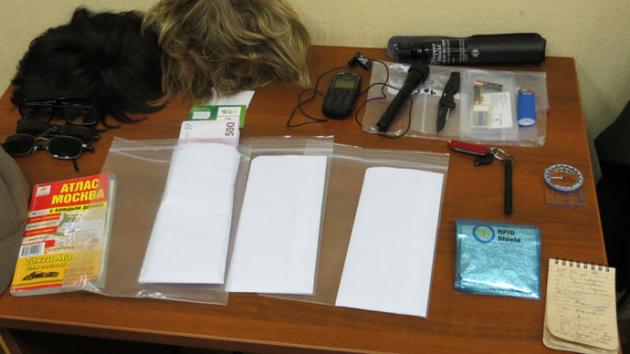
From Paul Sonne and Gregory L. White, Wall Street Journal: Russian authorities on Tuesday expelled an American they accused of being a U.S. Central Intelligence Agency officer operating under diplomatic cover in Moscow , alleging that he attempted to recruit a member of the Russian intelligence services involved in antiterrorism work.
Ryan C. Fogle, the third secretary in the political section at the U.S. Embassy in Moscow, was detained in the night hours stretching from Monday to Tuesday and subsequently released to U.S. diplomats, Russia’s Federal Security Service said in a statement. The FSB alleged that Mr. Fogle had called his would-be target, offering a payoff of €100,000 ($130,000) for cooperation. After an initial refusal, the would-be target agreed to meet on a second call, the FSB said.
Mr. Fogle was detained near a Moscow park around 11:30 p.m. Monday wearing a wig and carrying "special technical equipment," materials for a disguise and "a large sum" of cash, the FSB said. . . .
The expulsion comes at a sensitive time for the White House, which has sought in recent weeks to rebuild frayed ties with Moscow. A key element of those efforts has been cooperating on antiterrorism efforts in the wake of the Boston Marathon bombings, whose alleged perpetrators had roots in Russia’s Caucasus Mountain region.
The Russian Foreign Ministry said "such provocative actions in the spirit of the "Cold War" in no way help to strengthen mutual trust. The ministry said Mr. Fogle had been declared persona non grata and demanded his immediate departure in a meeting Tuesday with U.S. Ambassador Michael McFaul.
In announcing the allegations on Tuesday, the FSB said the would-be target was a Russian security officer responsible for fighting Islamist terrorists in that region. . . .
"At first, we couldn’t believe it happened," an unnamed FSB officer told U.S. Embassy officials who had come to pick up Mr. Fogle after his detention, according to a video released by the FSB. "Because you know that recently the FSB has been actively helping with the investigation of the explosions in Boston," he said. "Against this background, when relations between our countries are strengthening, an American diplomat commits in our view a state crime against the Russian Federation. . . ."
The U.S. has also been searching for tidbits from Russia about the activities of alleged Boston bomber Tamerlan Tsarnaev during his six-month trip to Russia last year. While Moscow and Washington have announced they are cooperating on the investigation, officials in Russia have been giving contradictory information about what they knew about Mr. Tsarnaev.
President Vladimir Putin and top security officials say Russia had no meaningful information, but officials in Dagestan say Mr. Tsarnaev was tracked closely.
Mr. Fogle’s detention, which led the nightly newscasts on state television, was the first expulsion of a U.S. diplomat from Russia on espionage charges since the early 2000s. . . .
The FSB released photos it said showed Mr. Fogle after his detention, as well as physical evidence the FSB said it had recovered. The authenticity of these couldn’t otherwise be verified.
One image shows a table strewn with the items that the FSB said it recovered from Mr. Fogle’s detention. On the table are two wigs, three pairs of glasses, three Ziploc bags filled with thousands of euros, a microphone, a compass, a knife and an RFID Shield, a sleeve that protects passports and credit-cards with computer chips from being read remotely.
The FSB also released a photo of a note for the would-be recruit that it alleged Mr. Fogle had been carrying.
Written in Russian that appeared to be that of a nonnative speaker, the note was addressed "Dear Friend" and signed "Your Friends." The note promised $100,000 to discuss the would-be recruit’s experience and "much more" if the recruit proved willing to answer specific questions of interest. . . .
The note instructed the would-be recruit to communicate with U.S. handlers via a Gmail account accessed either from a public Wi-Fi network or an Internet cafe. (photo: FSB/Russia Today)
Image: fsb%20rt%205%2014%2013%20Ryan%20Fogle%20material.jpg
